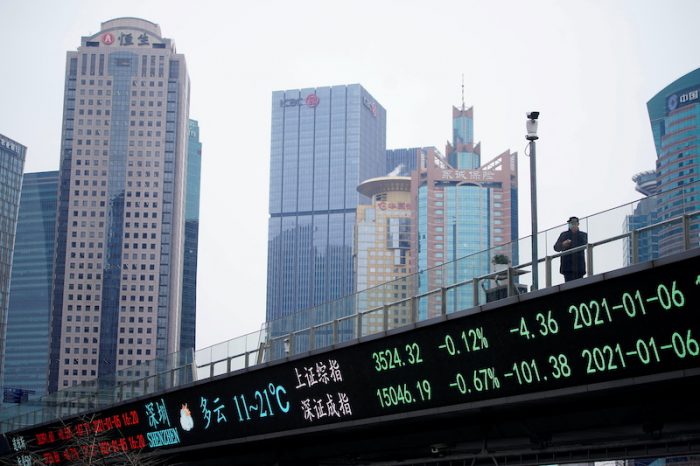Authorities in Beijing have been asking money managers in China for help to boost the country’s sluggish stock markets.
Financial regulators have informally urged some money managers to prioritise the launch of equity funds over other products like bond funds, four sources with direct knowledge of the matter said, as officials scramble to revive markets that have slumped to multi-year lows.
The “window guidance”, or unofficial, verbal advice from regulators, was given by the China Securities Regulatory Commission (CSRC) to some of the country’s biggest mutual fund managers in recent weeks, the sources said on condition of anonymity because the information was not public. The CSRC did not respond to a request for comment.
ALSO SEE: China Moves to Integrate EV Charging to National Power Grids
Bid to lift confidence amid property crisis, slowdown
China’s $3.8-trillion mutual fund industry is a key pillar of the country’s capital markets, but has seen sales, especially those of equity funds tapering off over the past year as stock benchmarks have slumped.
The move to launch new equity funds is part of a campaign by the authorities in the world’s second-largest economy over the past year to revive the stock market and boost investor confidence dented by a destabilising property sector crisis and sputtering growth.
While Beijing has rolled out a raft of measures aimed at boosting the economy in recent months, analysts have said the moves are not sufficient to restore market confidence and it is not clear if the latest guidance will either.
Past stock market support measures included halving stamp duty on stock trading, slowing the pace of initial public offerings (IPOs), encouraging margin financing and protecting small investors.
Four new equity funds
Despite those measures, China’s stock market was among the worst performers globally in 2023, with the blue chip CSI300 index closing the year with 11% losses, against a 20% gain for global stocks.
One of the sources, who works at a state-backed mutual fund, said the CSRC has recently required some fund managers to launch at least four new equity funds before launching any new bond fund.
A second source, at a foreign fund manager, said they had also received guidance from the regulator that raising equity funds should be prioritised over any other products, although no ratio limit on equity and bond funds was set.
In 2023, 334 new equity funds were launched in China, down 22% from 2022 and 49% from 2021, according to data from Shanghai-based Z-Ben Advisors, a funds industry consulting firm.
The proceeds raised by these funds also dropped 39% and 89% from 2022 and 2021, respectively, to 137.5 billion yuan ($19.18 billion).
In comparison, institutional-tailored bond funds, one of the most popular type of bond funds, saw the number of new launches fall 13% from 2022, but 14% above 2021 levels. The proceeds raised increased for the last three years.
Quicker approval for new funds
As part of Beijing’s latest push, the private funds sector, with assets of around 20 trillion yuan, has also seen quicker approvals for new equity funds than funds tracking other asset classes over the past two months, two additional sources said.
The CSRC since July has been rolling out reforms in the funds industry, guiding managers of all types of funds to cut management fees. Some announced fee cuts or started to purchase units in their own funds in the following months.
Recent fund announcements reviewed by Reuters show many bond funds cut short their subscription periods or restricted investor subscriptions, while it has taken much longer for equity funds to raise money and many have struggled to meet sales targets.
Even though the regulator is now nudging mutual fund managers to prioritise equity fund launches, there is no certainty that local investors, reeling from diminishing stock market returns, will invest.
Xia Chun, chief economist at Forthright Holdings Co, said he doubted promoting equity funds would have a significant impact.
“It’s tough to sell equity funds when the market is sluggish. The marketing cost is high but the effect could be low,” Xia said.
“This is the type of thing that would be better left to fund companies to decide for themselves.”
- Reuters with additional editing by Jim Pollard
ALSO SEE:
Second Shadow Bank Rocked by China’s Property Crisis
Two Executives From China’s Zhongzhi Missing After Collapse
China to Probe Troubled Shadow Bank Steeped In $64 Billion Debt
China Slashes Stamp Duty on Stock Trades Starting Monday
























